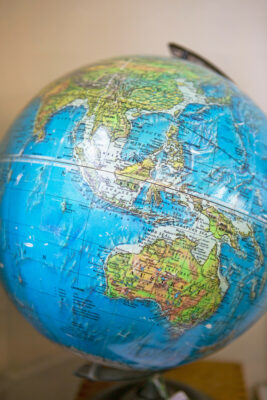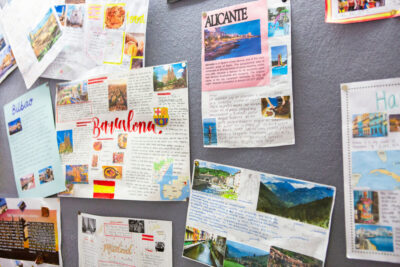Curriculum Vision and Intent
 Departmental Intent:
Departmental Intent:
- To teach students about the vitally important role that Geography plays in understanding how the world works in an increasingly globalised society, environment and economy.
- To aid our students in their journey to becoming well-rounded life-long learners who can demonstrate key skills and contribute positively to their local, national and global communities.
- To build character through encouraging our students to be curious, empathetic and to show stewardship.
- To encourage our students to reflect and learn from the diverse cultural mix of our school and community.
- To enhance our students’ cultural capital through the extensive range of topics and themes we cover, as well as extra clubs, super curriculum activities, lectures, seminars, fieldwork and trips.
KS3 curriculum and assessment
Key Stage 3
Years 7, 8 and 9
The study of geography stimulates an interest in and a sense of wonder about places. The Geography curriculum at Lady Margaret School is designed to help young people make sense of a complex and dynamically changing world. It explains where places are, how places and landscapes are formed, how people and their environment interact, and how a diverse range of economies, societies and environments are interconnected. It builds on students’ own experiences to investigate places at all scales, from the personal to the global.
Y7 Curriculum
- What is Geography?
- Map skills
- Rivers
- Megacities
- Settlement/ Fieldwork skills
Y8 Curriculum
- Population
- Coasts
- Globalisation
- Brazil
- Weather and Climate/ Fieldwork skills
Y9 Curriculum
- Tectonics
- Natural Resources
- Africa
- Tourism/ Fieldwork skills
- India
Assessment at KS3
Students at KS3 are assessed on their locational knowledge, their topic knowledge and their written essay skills.
All topics include four assessments – two major assessments and two minor assessments.
Major assessments:
- Short answer knowledge assessment
- Long answer essay assessment
Minor assessments:
- Map test
- Key words test
KS4 curriculum and assessment
KS4 GCSE – Year 10/11
Examination Board Edexcel A –
Geography at GCSE is not only up-to-date and relevant, it is one of the most exciting, adventurous and valuable subjects to study today. So many of the world’s current problems boil down to geography, and need the geographers of the future to help us understand them.
Global warming, sustainable food production, natural disasters such as earthquakes and tsunamis, the spread of disease, the reasons for migration, and the future of energy resources are just some of the great challenges facing the next generation of geographers.
GCSE Geography provides students with a clear, overall view of aspects of our world in the first part of the 21st century. Teaching methods encourage and stimulate students to become active and independent learners. Like geography itself, the aims of the course are wide ranging and give students the opportunity to:
- Acquire a knowledge of geographical concepts, develop a sense of place and an appreciation of the environment
- Appreciate the dynamic nature of Geography and our rapidly changing world
- Understand the significance of people’s values and attitudes in decision making
- Be aware of their responsibilities to other people, the environment and the sustainability of the planet and develop an understanding of global citizenship
- Undertake individual research and investigative work and to make use of modern information technologies, including Geographical Information Systems
- Acquire and apply geographical skills and techniques: communication skills, graphical skills, interpersonal skills through debate and discussion, literacy and numeracy, problem solving skills, entrepreneurial skills and awareness of career possibilities.
The Edexcel A specification provides a balanced coverage of physical, human and environmental aspects of Geography. The information below shows an overview of the content and assessment of the specification.
Exam board Edexcel A
Physical exam (Paper 1)
Section A: Coastal landscapes and processes AND river landscapes and processes. Section B: Weather hazards and climate change Section C: Ecosystems, biodiversity and management
This paper is a 1 hour and 30 min written exam worth 94 marks which is 37.5% of the overall grade.
Human exam (Paper 2)
Section A: Changing cities
Section B: Global development
Section C: Energy resource management
This paper is a 1 hour and 30 min written exam worth 94 marks which is 37.5% of the overall grade.
Geographical investigations: fieldwork and UK challenges (Paper 3)
In this paper students are tested on fieldwork techniques and knowledge of the UK from paper 1 and paper 2
This paper is a 1 hour and 30 min written exam worth 64 marks and 25% of the qualification
KS5 curriculum and assessment
Key Stage 5 – Year 12/13 Examination Board Edexcel
 Carrying on with Geography from GCSE to A level can open the doors to a university degree, either specifically in Geography or by combining Geography with other A levels to gain a place on another degree programme.
Carrying on with Geography from GCSE to A level can open the doors to a university degree, either specifically in Geography or by combining Geography with other A levels to gain a place on another degree programme.
Geography at A level should be studied by those who want to further their understanding of the world in which they live. The subject provides the scope to engage with the relationship of human populations to each other over space and time and the opportunities and challenges of the physical environment. Students will be expected to undertake their own research and make presentations. There are two field trips, one to the Sussex coast and one to Shepherd’s Bush in Year 12 for students to learn and develop fieldwork skills for their NEA.
Year 12
In year 12, all candidates will study core human and physical geography. Students will develop a variety of geographical skills, which will broaden and deepen existing knowledge and gain a greater degree of independence.
Topics studied in Year 12:
Dynamic Landscapes
- Tectonic Processes and Hazards
- Landscape Systems, Processes and Change- 2B: Coastal Landscapes
Dynamic Places
- Globalisation
- Shaping Places- 4A Regenerating Places
Topics studied in Year 13:
Year 13
Physical Systems and Sustainability
- The water Cycle and Water Insecurity
- The Carbon Cycle and Energy Security
Global Development and connections
- Superpowers
- Global Development and connections- 8A: Health, Human Rights and Intervention
Exam overview
Paper 1- 30% of qualification
- Assessing topics 1,2B, 5 and 6 and geographical skills
- 2 hours and 15 minutes
- 105 marks
Paper 2- 30% of qualification
- Assessing topics 3, 4A, 7 and 8A and geographical skills
- 2 hours and 15 minutes
- 105 marks
Paper 3- 20% of qualification
- Synoptic Investigation
- 2 hours and 15 minutes
- 70 marks
Coursework- 20% of the qualification.
Independent Investigation
- Internally assessed, externally moderated written report (3000-4000 words)
- 70 marks
Extra and super-curricular opportunities
KS3:
- Super curriculum booklet with examples of writing, reading, research, watching and visiting opportunities for each KS3 topic.
- Geography club
KS4:
- Super curriculum booklet with examples of writing, reading, research, watching and visiting opportunities for each KS4 topic.
- Opportunity to attend the 6th for seminar group. This is an extra reading group where the students are challenged to read academic articles and then discuss them in the session. This also develops the students’ case study knowledge.
KS5:
- School membership to the Royal Geographical Society. This provides the students with opportunities to attend members lectures and access resources.
- Seminar group- This is an extra reading group where the students are challenged to read academic articles and then discuss them in the session. This also develops the students’ case study knowledge.
Future opportunities (careers, university courses)
University options
Past students have said that the skills they learnt in Geography at school have greatly helped them prepare for life as an undergraduate when completing assignments and dissertations. They have left feeling confident about their knowledge, communication and written abilities and have gone on to excel at University. Some of our recent graduates have gone on to geography study at:
- University of Bristol
- University of Exeter
- University of Reading
- Newcastle University
We have also helped students with their applications for Oxbridge.
Career options
Geography prepares students for a wide range of careers and can increase employability across many disciplines. Geography is recognised for its academic robustness and, most importantly, it also helps young people into the world of work. Employers prize the knowledge and skills that Geography can provide, for example knowing how the world works, planning research and report writing, working in a team, using new technologies and communication skills – and much more. You will find geographers working in a wide range of jobs, from the City to planning, working in the environment to travel and tourism, or in international charities or retail. Studying Geography helps young people achieve careers that are professionally and financially rewarding and also enjoyable.
Possible careers – Geography Degree
Policy and Government:
- Flood management
- Public communications
- Development advisor
- Environment sector
Geographical Information Systems:
- Police Geographical Information Analyst
- Hydrologist
- Land requirements officer
The Built Environment:
- Town planner
- Chartered Surveyor
- Events executive
- Property Manager
- Transport consultant
Travel, Tourism and Leisure:
- Conservation project coordinator
- Educational travel consultant
- Expedition manager
- Incident response manager
- Travel writer
- Broadcaster
- Travel journalist
The Business World:
- Responsibility and sustainability manager
- National accounts manager
- Natural resource manager
- Sales
- Oil- resource manager
Society:
- Teacher
- Manager of national park
- Fundraising officer for a charity
- Prison officer
- Livelihoods Project Officer
- Charity worker
- Outreach worker
The Physical Environment:
- Pollution specialist
- Catastrophe Risk Analyst
- Coastal Technical Specialist
- Soil Mechanic Scientist
- Ecologist
- Wildlife Conservationist

